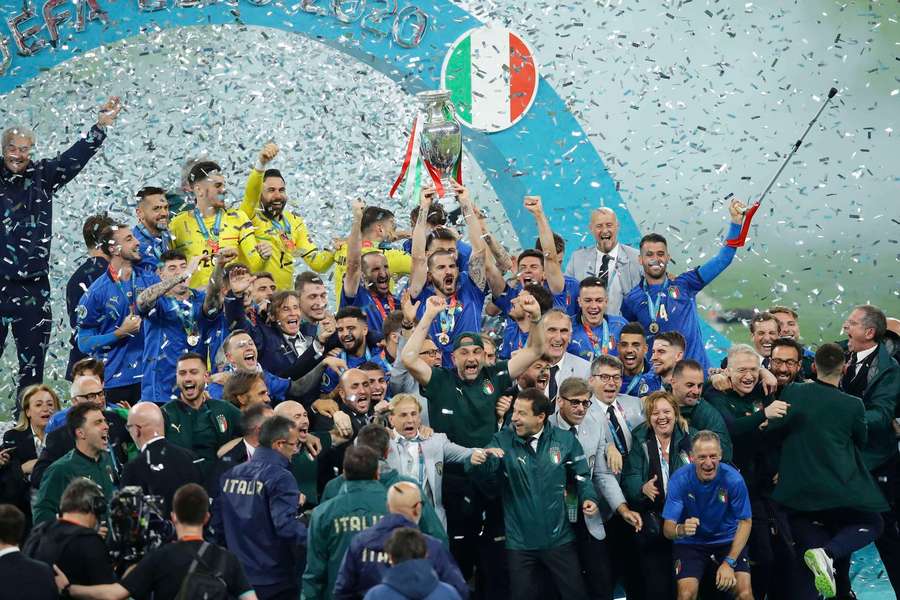EURO Rewind: Euro '2020' sees Italians upset the odds in a tournament like no other

Only three times in history has the World Cup or Euros been called off because of non-sporting events. In 1942 and 1946, football took a back seat due to World War II before resuming in 1950, and in 2020, the European Championships had to be postponed for a year, not because of a war but because of a pandemic.
COVID-19 took the entire planet by storm and UEFA had to give in to health requirements, with the tournament that was supposed to mark the continental body's 60th anniversary, with matches spread across Europe, having to wait until 2021.
And even then, restrictions in place limited the number of spectators in the stands in many countries, and many fans were unable to travel with their national team.
Because cases of COVID could occur at any time within squads, UEFA agreed to expand the sizes to 26 players instead of the usual 23, a decision that was kept for 2024, although the reasoning was quite different this time, namely the players' busy schedule which exposed them to injuries.
A contradictory Italy
Roberto Mancini made the most of UEFA's decision, using 25 of his 26 players in seven matches, with only goalkeeper Alex Meret having to watch from the sidelines entirely - second-choice Salvatore Sirigu got two minutes in the final 1-0 group game against Wales.
At that point, qualification had already been secured, with the Azzurri having also won against Turkey 3-0 and Switzerland 3-0 in their previous two matches.
But despite the good performances in the group stage, Italy were not considered big favourites for the title. Hardly enjoying a golden generation of talent, they had missed out on the 2018 World Cup in Russia and, as it would later turn out, would not be present at the tournament in Qatar four years later.
However, between those two monumental failures, Mancini's side somehow managed to win a European title, 53 years after their previous continental success, which is the longest period between trophies for any national team to become champions at least twice.
It's coming home!
A hard-fought victory over Austria in the last 16 (2-1 after extra time), a somewhat nervy 2-1 quarter-final win over Belgium and a dramatic semi-final against Spain (1-1, 4-2 after penalties) would unexpectedly put the Azzurri in a position to challenge England for the title.
The Three Lions had home advantage, with UEFA deciding that that anniversary year's European festival of football would culminate in a final act at London's Wembley Stadium.
English fans were ecstatic after their team qualified for the final and the phrase "It's coming home" was on everyone's lips, alluding to the fact that the trophy would finally arrive in the country that gave the world football.
So great was the fans' desire to witness such success that the surroundings of Wembley witnessed chaotic moments both before the match when the stadium gates were stormed, and after it, when England fans vented their anger after a losing final.
A cagey final
There could not have been a better start for England if coach Gareth Southgate himself had written the script, with Luke Shaw managing to open the scoring in the second minute in front of a crowd that erupted.
But then came the setback. Harry Kane became more of a holding midfielder and not the feared goalscorer of the Three Lions as Southgate tried to protect the lead in the hope that one goal would be enough to win the coveted trophy.
It was a rather Italian strategy, and a team as used to attacking as England's would eventually prove its limitations. Veteran defender Leonardo Bonucci managed to restore parity from a corner in which the otherwise fairly well-organised home defence had made a mistake.
With no further big chances until the end of the 90 and then 120 minutes, the final was to be decided on penalties.
It's coming Rome!
England don't have a great relationship with the lottery that is a penalty shootout.
The English lost their first three such shootouts at the World Cup: in 2006 to Portugal in the quarter-finals, in 1998 to Argentina in the last 16 and in 1990 to Germany in the semi-finals, before winning against Colombia in the 2018 round of 16.
At the Euros, the record was similar. They lost to Italy in the quarter-finals of Euro 2012, were knocked out by Portugal in the quarter-finals of Euro 2004 and were beaten by Germany in the semi-finals of Euro 96. Their only penalty shootout win at a European Championship came in the quarter-finals of Euro 96 against Spain.
Italy were no experts either. They had lost on penalties at the 1990, 1994 and 1998 World Cups, as well as the 1980, 2008 and 2016 European Championships. In the Wembley final though, they were fortunate enough to be up against a team weaker than them in that respect, with an England side that went to penalties often considered three-quarters beaten.
Two missed penalties by Italy would probably have cost them the title against any other team, but England missed three and Italian fans could finally shout "It's coming Rome!"
Italy thus became the first team in history to win two games on penalties at a single Euros, having beaten Spain in the same fashion.
Team of the Tournament
Goalkeeper: Gianluigi Donnarumma (Italy)
Defenders: Kyle Walker (England), Leonardo Bonucci (Italy), Harry Maguire (England), Leonardo Spinazzola (Italy)
Midfielders: Pierre-Emile Hojbjerg (Denmark), Jorginho (Italy), Pedri (Spain)
Forwards: Federico Chiesa (Italy), Romelu Lukaku (Belgium), Raheem Sterling (England)
